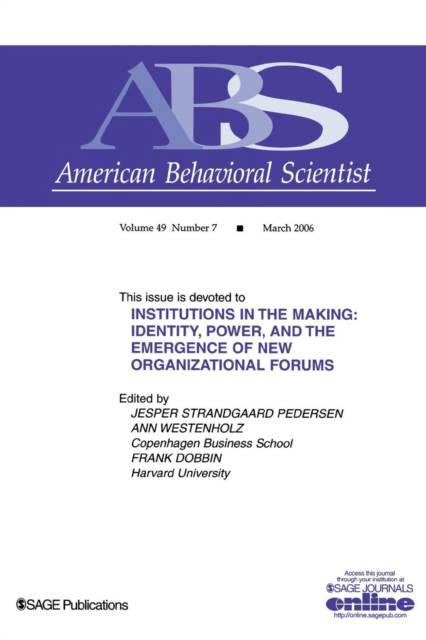
- Retrait gratuit dans votre magasin Club
- 7.000.000 titres dans notre catalogue
- Payer en toute sécurité
- Toujours un magasin près de chez vous
- Retrait gratuit dans votre magasin Club
- 7.000.000 titres dans notre catalogue
- Payer en toute sécurité
- Toujours un magasin près de chez vous
Institutions in the Making
Identity, Power and the Emergence of New Organizational Forms
Description
The March 2006 issue of American Behavioral Scientist, entitled Institutions in the Making: Identity, Power and the Emergence of New Organizational Forms features new insights on institutional change and theory, exploring, collectively and individually, how new institutions first emerge within and among organizations. Based on a workshop entitled "New Public and Private Models of Management: Sensemaking and Institutions" in Skagen, Denmark in Summer 2005, the 11 articles look at key organizational trends in institutional change, including corporate governance, social responsibility, and new work roles.
The first two articles deal with mediating the micro-macro divide in institutional theory. Pedersen and Dobbin offer insights into the four types of processes through which practices and ideas from the wider organizational field become distinct organizational cultures. Hallett and Ventresca reexamine Gouldner′s Patterns of Industrial Bureaucracy and the "coupling" processes that were considered key mechanisms in the emergence of new institutional forms.
Campbell and Boxenbaum focus on the rise of corporate social responsibility. Campbell explores the political and economic motives that underlie the current definition of corporate social responsibility, and raises the question of why corporations ever act in socially responsible ways. Boxenbaum shows how a practice from one place can be adapted into a different environment by going through the processes of individual preferences, strategic reframing, and local grounding.
The next three articles target corporate governance in diverse arenas such as the European defense industry and the American thrift industry. Fligstein and Enrione, Mazza, and Zerboni review how decision-makers negotiate new institutional models with interested groups, and how decision-makers may end up creating institutions that are not anything like what they originally envisioned. Haveman and Rao investigate how change in the form of governance occurred over time and circumstance.
Patriotta and Lanzara, Meyer and Hammerschmid, and Westenholz each consider how work roles and identities become institutionalized and how they affect organizations. Drawing on wide-ranging examples from an automotive factory, public administrators in Austria, and IT workers, the last three articles attempt to account for the global and local dynamics that shape worker identities and roles.
Together these articles suggest a number of promising research avenues for those interested in how new organizational elements, ideas, and practices come about and evolve. This issue should be in the library of every forward-thinking manager, organizational behaviorist, industrial and organizational sociologist, and business school professors and students.
Spécifications
Parties prenantes
- Editeur:
Contenu
- Nombre de pages :
- 240
- Langue:
- Anglais
- Collection :
- Tome:
- n° 384
Caractéristiques
- EAN:
- 9781412940252
- Date de parution :
- 02-10-06
- Format:
- Livre broché
- Format numérique:
- Trade paperback (VS)
- Dimensions :
- 152 mm x 228 mm
- Poids :
- 204 g






